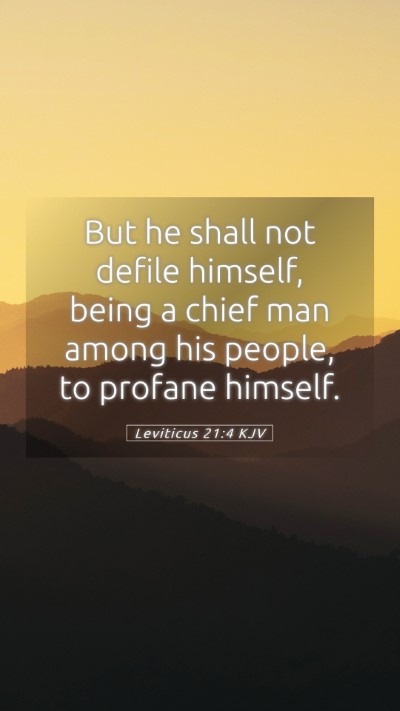Understanding Leviticus 21:4
The Bible verse Leviticus 21:4 provides essential insight into the conduct required of priests in the Old Testament, particularly focusing on the expectations of holiness and the repercussions of becoming emotionally compromised due to mourning. This overview presents combined interpretations and meanings drawn from various public domain commentaries to offer clarity and depth regarding this scripture.
Verse Context
Leviticus 21:4 states: “Neither shall he defile himself, being a chief man among his people, to profane himself.” This verse speaks to the responsibilities and conduct expected of high priests and their observance of the laws regarding purity and separation from the dead.
Interpretations and Meanings
- 1. Significance of Holiness: The holiness of the priesthood is emphasized, where being a leader among the people comes with the obligation to maintain a standard of moral and ceremonial purity as noted by Matthew Henry.
- 2. Avoiding Defilement: Albert Barnes highlights how spiritual leaders must avoid actions that would defile them, particularly through mourning rituals which could distract from their sacred duties.
- 3. Compassion vs. Duty: The balance of compassion for the deceased while holding to the urgent duties of priestly service is a point emphasized by Adam Clarke. This reflects the struggle between personal grief and professional responsibilities.
- 4. Community Role: Leaders’ actions can have a profound impact on their community; Matthew Henry notes that their failure to uphold standards affects public perception of holiness in worship.
- 5. Implications for Today: Though Leviticus pertains to ancient Israel, the underlying message regarding the expectation of holiness and the responsibilities of spiritual leadership resonates within modern contexts, urging leaders to maintain integrity.
Application in Daily Life
This verse serves as a reminder for individuals—especially those in spiritual leadership positions—regarding the need for careful conduct and the importance of prioritizing duties over personal trials. Reflection on how one's personal grief may affect their public responsibilities can lead to better self-awareness and community leadership.
Cross References
- Numbers 6:6-7 - Discusses restrictions on Nazarites, enhancing the theme of holiness.
- Ezra 10:3 - Calls for the separation from unclean practices, paralleling the call for purity in Leviticus.
- Ezekiel 44:25-27 - Speaks about the priests' duties concerning mourning, aligning with the themes of Leviticus 21:4.
Conclusion
Leviticus 21:4 extends beyond a mere command regarding physical purity; it encompasses broader themes of holiness, leadership, and the challenge of balancing personal emotion with professional obligation. These insights are vital for readers seeking to understand scripture within the framework of biblical exegesis and through practical applications in modern life.
Further Study
For those engaged in Bible study groups or online Bible study, reflecting on this verse can lead to deeper insights into the nature of service and leadership in faith. Utilizing Bible study tools and Bible study resources can enhance your understanding of such passages and their relevance today.
Additional Resources
- Bible Study Guides: Explore materials that discuss priestly duties and holiness.
- Bible Study Topics: Consider focusing sessions on the implications of ancient laws in contemporary life.
- Bible Study Courses: Enroll in studies regarding Old Testament laws and their applications.


